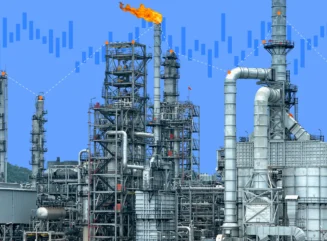Environmental pricing data, including emissions for EMEA and North America, as well as North American Biofuels.
Around 90% of newly commissioned renewable energy is more cost-effective for electricity generation than most fossil fuels worldwide, according to a June 2025 report from the International Renewable Energy Agency (IRENA).1 However, while the news is good for the energy transition and climate impacts, it highlights the need for significant energy market reform to help fund further renewables.
IRENA’s latest report said that in the full year 2024, 582 gigawatts of new renewable energy capacity – hydropower, solar, wind and geothermal – was added globally, up 20% from 2023.2
“Onshore wind retained its position as the most affordable source of new power generation globally, with a global weighted average levelized cost of electricity (LCOE) of USD 0.034/kWh, closely followed by solar PV at USD 0.043/kWh and hydropower at USD 0.057/kWh. After more than a decade of steep cost declines, solar and wind energy prices have begun to stabilise – a natural sign of market maturity,” Francesco La Camera, Director-General of IRENA, said in the report.3
Renewable “cannibalisation”
The growth in new projects will help countries to meet the target set at the COP28 UN climate conference in 2023 to triple the amount of renewables in a bid to keep a 1.5 degree Celsius (2.7 Fahrenheit) warming limit this century within reach. Continued technological innovation, increasingly competitive supply chains and growing economies of scale have helped drive down the cost of producing renewable energies, but in the near-term, there are still challenges to overcome to continue the energy transition.
The US decision to pull back from climate commitments and renewable projects may slow things down, while its trade tariffs and accompanying geopolitical tension could drive costs back up.
But apart from these risks, the transition has reached a tipping point where funding further renewable energy projects has become difficult because falling futures prices are leading to declining profit values for investors. Renewables have for the most part, and particularly in Europe, been driven by power purchase agreements in which projects are funded based on the expectation of profits from future electricity prices. As the share of renewables grows, an increasing number of projects are feeding electricity onto the grid simultaneously, which can even lead to negative electricity prices. In a sense, the renewables market is “cannibalising” itself, eroding its own value by driving down prices.
Batteries and grids
Energy market reform will be part of the answer, but companies will also need to consider shorter power purchase agreement terms and strategic storage solutions. A key factor for renewable energy sustainability is to find ways to store the power generated from projects, both to smooth out price volatility and help feed grids that are used to steady, not fluctuating, power.
Here too, IRENA has positive news, as battery energy storage systems, continue to see rapid cost reductions. In 2024, the cost of utility-scale battery storage fell to USD 192/kWh – a 93% decline since 2010 – driven by manufacturing scale-up, improved materials and production efficiencies.4
Hybrid projects that combine wind, solar and storage are increasing, offering the smoother energy production that the market is used to.
“In China, solar-plus-storage systems have helped mitigate curtailment risks in provinces with high renewable penetration. In the United States, the integration of BESS with new solar capacity has accelerated, enabling dispatch during peak demand and deferring investments in peaking gas plants. Hybridisation is also being explored with geothermal and CSP, particularly for long-duration storage applications,” IRENA reported.5
But investment in existing grids to expand them, make them more flexible and modernise connections is sorely needed. Grid constraints are the limiting factor for a substantial volume of wind and solar projects worldwide and integration costs can vary significantly for developers depending on project location, grid distance and infrastructure availability.6
“In some regions, permitting delays and grid infrastructure constraints are already slowing deployment. Urgent action is needed to address these barriers, and to both speed up and scale up the energy transition,” said La Camera.7
The European Guarantees of Origin (GoO) market is a cornerstone of renewable energy certification, enabling transparency and trust in green energy consumption across borders. Access to consistent and actionable GoO pricing data has long been limited—but Parameta Solutions is changing that with daily End of Day assessments that bring new clarity to the market. This data helps you manage risk, optimize trading strategies, and meet regulatory requirements with confidence. Find out more about our GoO data here .
Related Solutions
Turn to Parameta for comprehensive environmental and energy & commodities data to help you navigate complexity, manage risk, and seize new opportunities.
Related Solutions
Turn to Parameta for comprehensive environmental and energy & commodities data to help you navigate complexity, manage risk, and seize new opportunities.
Energy & Commodities
Independent, granular pricing, and liquidity insights to optimize hedging strategies, price contracts accurately, and mitigate risk exposure.
Bibliography
Bibliography
[1] https://www.irena.org/Publications/2025/Jun/Renewable-Power-Generation-Costs-in-2024
Read Source[2] https://www.irena.org/Publications/2025/Jun/Renewable-Power-Generation-Costs-in-2024
Read Source[3] https://www.irena.org/Publications/2025/Jun/Renewable-Power-Generation-Costs-in-2024
Read Source[4] https://www.irena.org/-/media/Files/IRENA/Agency/Publication/2025/Jul/IRENA_TEC_RPGC_in_2024_2025.pdf
Read Source[5] https://www.irena.org/-/media/Files/IRENA/Agency/Publication/2025/Jul/IRENA_TEC_RPGC_in_2024_2025.pdf
Read Source[6] https://www.irena.org/-/media/Files/IRENA/Agency/Publication/2025/Jul/IRENA_TEC_RPGC_in_2024_2025.pdf
Read Source[7] https://www.irena.org/-/media/Files/IRENA/Agency/Publication/2025/Jul/IRENA_TEC_RPGC_in_2024_2025.pdf
Read SourceDisclaimer
© 2025 ICAP Information Services Limited (“IISL”). This communication is provided by ICAP Information Services Limited or a member of its group (“Parameta”) and all information contained in or attached hereto (the “Information”) is for information purposes only and is confidential. Access to the Information by anyone other than the intended recipient is unauthorised without Parameta’s prior written approval. The Information may not be not used or disclosed for any purpose without Parameta’s prior written approval, including without limitation, storing, copying, distributing, licensing, selling or displaying the Information, using the Information in an application or to create derived data of any kind, co-mingling the Information with any other data or using the data for any unlawful purpose of for any purpose that would cause it to become a benchmark under any law, regulation or guidance. The Information is not, and should not be construed as, a live price, an offer, bid, recommendation or solicitation in relation to any financial instrument or investment or to participate in any particular trading strategy or constituting financial or investment advice or a financial promotion. The Information does not constitute a public offer under any applicable legislation or an offer to sell or a solicitation of an offer to buy any securities. The Information is not to be relied upon for any purpose whatsoever and is provided “as is” without warranty of any kind, either expressly or by implication, including without limitation as to completeness, timeliness, accuracy, continuity, merchantability or fitness for any particular purpose. All representations and warranties are expressly disclaimed, to the fullest extent possible under applicable law. In no circumstances will Parameta be liable for any indirect or direct loss, or consequential loss or damages including without limitation, loss of business or profits arising from the use of, any inability to use, or any inaccuracy in the Information. Parameta may suspend, withdraw or modify or change the terms of the provision of the Information at any time in its sole discretion, without notice. All rights, including without limitation intellectual property rights, in and to the Information are, and shall remain, the property of IISL or its licensors. Use of, access to or delivery of Parameta’s products and/or services requires a prior written licence from Parameta or its relevant affiliates. The terms of this disclaimer are governed by the laws of England and Wales.




